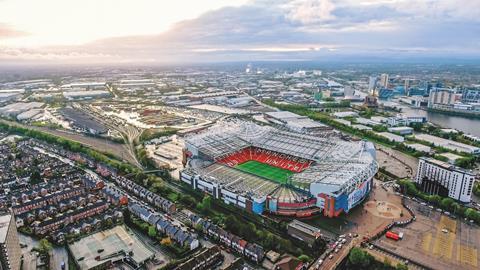Manchester mayor said redevelopment of the ground and the surrounding area could be the “biggest regeneration scheme in the country”
Manchester United co-owner Jim Ratcliffe will make a decision on plans to redevelop Old Trafford in mid-to-late 2024, according to Andy Burnham.
The club is currently weighing up options to either refurbish the existing Old Trafford stadium or build an entirely new one on neighbouring land that it already owns.
Club owners will make a decision “towards the middle of the year or the later part of the year,” Burnham told the BBC.
The Manchester mayor has said the plans could be the “the biggest regeneration scheme in the country”, including much wider infrastructure investments in the surrounding area.
“Thousands of jobs could be brought to Greater Manchester, with the stadium at the heart of it,” he added.

“We have seen what has happened on the east of Manchester, with the investment that has gone in. I am looking at a balancing investment on the west of Manchester that will set this city up to be the capital of football around the world in the 21st century.
>> See also: ‘I love developing, contracting, designing’ – Gary Neville on his journey from pitch to property
>> To refurb or rebuild: what next for Old Trafford?
>> Old Trafford dilemma: how six other major stadium projects fared
“People should just get away from the idea of public sector money, that is not the issue, it is much broader, with transport, employment and new investment into our city region. That is what is at stake here.”
Burnham’s comments come after the football club announced a taskforce for redeveloping the Old Trafford area and creating a new “national stadium for the north”.
It includes Sebastian Coe, who masterminded the bid for the London Olympics, Burnham and ex-Manchester United captain Gary Neville, along with Trafford council chief executive Sara Todd and a fans group member.
An economic impact assessment will be drawn up and the group is expected to make recommendations later this year.
Coe said: “I have seen the potential for stadiums to become focal points for strong communities and catalysts for social and economic development.
“That was certainly true of the venues we built in east London for the 2012 Olympics, and we are overdue a project of similar scale and ambition in the north of England.”
Neville, who co-owns Hotel Football next to the ground, said the scheme could be a “catalyst for sustainable, cohesive growth in an area of the city that has been neglected for too long”.
Ratcliffe, who has taken a 27.7% share in United, said last month that his preference was to build a new stadium rather than refurbishing the existing ground, which he believed would “not be perfect” because of the age of the building.
He has already committed £237m of his own money for infrastructure improvements in his recent investment in the club.
Any redevelopment of Old Trafford would cost far more and the club is expected to look for financial support, both from private funders and a public-private partnership.
Ratcliffe said it could be a major regeneration of a part of Manchester which had become “tired and neglected”, adding that it would contribute to the ‘levelling up’ of the city following the cancellation of the northern HS2 leg.
“The north-west of England has a greater concentration of major football clubs than anywhere else in the world, yet we don’t have a stadium on the scale of Wembley, the Nou Camp or Bernabéu,” Ratcliffe said.
>> See also: HS2: Where do Manchester and the North-west go from here?
Laing O’Rourke has previously carried out improvement work at the ground, which dates back to 1909, and would be an early favourite for work – provided it can reach an agreement.
Last year, O’Rourke was set to carry out an expansion of Manchester City’s Etihad ground but left the scheme after failing to agree a price. Sisk will carry out the work although its appointment has not yet been formally confirmed.




























No comments yet